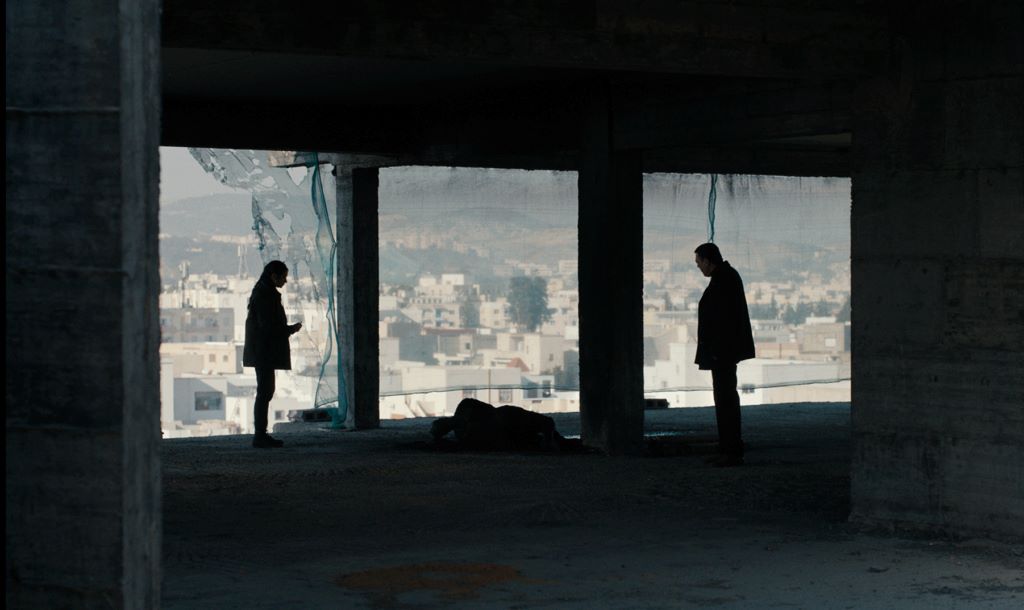In the vast landscape of cinematic thrillers, even narrower in an African context, “Ashkal” stands out as a curious blend of police procedural and speculative fiction, wrapped in an enigmatic coating reminiscent of David Lynch’s works. Directed by the talented Tunisian-born filmmaker, Youssef Chebbi in his first solo feature effort, the film made its mark with a premiere at the Directors’ Fortnight during the 2022 Cannes Film Festival.
Set in the hauntingly desolate Gardens of Carthage district in Tunis, the narrative is deeply rooted in the aftermath of the 2011 Arab uprising. This district, once a symbol of modernity under President Zine El Abidine Ben Ali, now stands as a stark reminder of halted progress with its unfinished apartment blocks. The film uses this setting not just as a backdrop but as a character in itself, reflecting the nation’s tumultuous journey post-revolution.
The story is sparked by the discovery of a charred body at a construction site, leading to a whirlwind of inquiries. Was this a mere suicide or a manifestation of something darker?
As the narrative unfolds, two dedicated police officers, Fatma (portrayed by Fatma Oussaifi) and Batal (played by Mohamed Houcine Grayaa), find themselves entangled in a web of mysteries as another burnt body surfaces. The victim was not killed by fire but by something else; something that leaves no trace, no motive, no explanation; something that seems to be connected to the history of torture and repression under Ben Ali’s regime. The testimonies of witnesses, albeit unreliable, hint at a supernatural element, further deepening the mystery.

Chebbi’s storytelling ability is evident throughout the film. He seamlessly weaves in the investigations of the Truth and Dignity Commission into police corruption and torture, painting a vivid picture of a city where violence seeps from its very core.
The film’s atmosphere is further heightened by its effective sound design, which punctuates the narrative with eerie echoes, adding layers of tension and suspense.
Hazem Berrabah’s cinematography deserves special mention. His portrayal of the Gardens of Carthage, with its unfinished structures, creates a moody and stylish visual aesthetic that enhances the mood and tone of the film. The play of light and shadow across these concrete edifices creates an ambiance of creeping dread.
As the plot thickens, “Ashkal” transcends the boundaries of traditional detective stories. Elements of the supernatural begin to emerge, drawing parallels with iconic paranormal investigations like those in “The X-Files.”
It is not a conventional whodunit, but rather a whydunit. It does not focus on finding the culprit, but on exploring the themes of justice, truth, and dignity.
It questions the role of the police in a post-revolutionary society, where corruption and violence are still rampant. It also examines the psychological effects of trauma and guilt on the characters, who are haunted by their own pasts and secrets.
In essence, “Ashkal” challenges viewers to grapple with broader themes, touching on terrorism, political protest, and the very nature of reality. It delves deep into the psyche of its characters and its audience, leaving many questions unanswered.
Rather than providing clear resolutions, Chebbi invites viewers to immerse themselves in the film’s unsettling mood and draw their own conclusions. “Ashkal” promises to linger in the minds of its audience, urging them to reflect on the complexities of the world around them.
Yellow Veil Pictures releases “Ashkal: The Tunisian Investigation” in U.S. theaters (New York and Los Angeles to start) this Friday, August 18, 2023. And on digital August 22, 2023.
If you appreciate our coverage here and on social media and would like to support us, please consider making a donation today. Your contribution will help us continue to do the work we do in coverage of African cinema and, more importantly, grow the platform so that it reaches its potential, and our comprehensive vision for it. Thank you for your support: https://gofund.me/013bc9f2.
